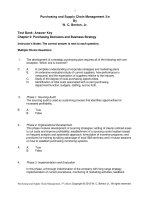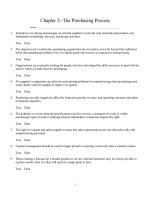Lecture Purchasing and supply chain management (3rd/e): Chapter 3 - W. C. Benton
Bạn đang xem bản rút gọn của tài liệu. Xem và tải ngay bản đầy đủ của tài liệu tại đây (601.11 KB, 13 trang )
Chapter 3:
The Legal Aspects
of Purchasing
Purchasing and Supply Chain Management
3rd edition
Purchasing and Supply Chain Management, 3rd edition, Copyright © 2013, W. C. Benton Jr., All rights reserved.
Purchasing and Supply Chain Management, Copyright 2013. W. C. Benton
1
Purchasing manager
•
The purchasing manager is an agent for the firm.
•
The agency concept:
•
An agency relationship requires at least three parties:
•
the principal
•
the agent
•
the one with which the agent conducts business on behalf of the
principal
2
Purchasing and Supply Chain Management, 3rd edition, Copyright © 2013, W. C. Benton Jr., All rights reserved.
Authority of the Purchasing Manager
•
The three types of purchasing authority:
1. Express authority
•
•
•
•
•
2. Implied authority
By the principal
Occurs automatically when
appointed
Stated in company bylaws
By law
Occurs at the time the principal
expressively grants authority
Protecting the principal’s rights
when a consultation with the
principal is impossible at the
time
3
Purchasing and Supply Chain Management, 3rd edition, Copyright © 2013, W. C. Benton Jr., All rights reserved.
•
3. Emergency authority
Legal Requirements of a Purchase Contract
•
According to laws, a legal transaction requires all four
components:
1.
The parties must be capable.
2.
The subject of the matter must be legal and valid.
3.
There must be mutual consideration .
4.
The parties must reach an agreement by offer and acceptance.
4
Purchasing and Supply Chain Management, 3rd edition, Copyright © 2013, W. C. Benton Jr., All rights reserved.
Components of an Offer
•
Three components:
1.
Intent to make an offer.
2.
Communication of the offer intent.
3.
Identification of the specific subject matter.
5
Purchasing and Supply Chain Management, 3rd edition, Copyright © 2013, W. C. Benton Jr., All rights reserved.
The Four Outcomes to an Offer
The offer may lapse.
1.
Time Limits of an Offer:
•
Specified
•
•
E.g., immediate acceptance
Unspecified
•
•
Reasonable period according to law
The offer may be rejected.
2.
•
Either verbal or written
•
If the offer is amended, it becomes a counteroffer
6
Purchasing and Supply Chain Management, 3rd edition, Copyright © 2013, W. C. Benton Jr., All rights reserved.
The Four Outcomes to an Offer (cont.)
The offer may be revoked.
3.
•
According to the law, an offer can be revoked anytime before it
is accepted.
•
However, this should be avoided if possible.
The offer may be accepted.
4.
•
A contract is made
7
Purchasing and Supply Chain Management, 3rd edition, Copyright © 2013, W. C. Benton Jr., All rights reserved.
Terms of Contracts
•
Quantity
•
An offer must express a fixed quantity of a sale.
•
•
The unit of measure of quantity is unique to the industry.
•
•
A contract that does not specifically express quantity is unenforceable.
E.g., Concrete is quoted in cubic yards.
Quality
8
Purchasing and Supply Chain Management, 3rd edition, Copyright © 2013, W. C. Benton Jr., All rights reserved.
Terms of Contracts (cont.)
•
Price and Credit Terms
•
Price is the third major term.
•
Must be included in an enforceable contract
•
Price is determined when the offer is accepted.
•
Price escalation clauses
•
Negotiate the credit terms with the supplier.
9
Purchasing and Supply Chain Management, 3rd edition, Copyright © 2013, W. C. Benton Jr., All rights reserved.
Terms of Contracts (cont.)
•
Delivery Terms
•
Formalize the responsibilities of the buying and selling firm for
delivery of the goods.
•
•
E.g., Free on board (FOB)
Leasing
•
Becoming more attractive
•
Tax and equity effects
10
Purchasing and Supply Chain Management, 3rd edition, Copyright © 2013, W. C. Benton Jr., All rights reserved.
Ethics
•
•
Defined as the standards of right conduct
The law can only codify and enforce the most egregious
violations.
•
•
•
E.g., fraud and exploitation
Thus, Ethics play a large role regarding fairness in
negotiations.
Purchasing agents are governed by:
•
Company’s ethical policies
•
Uniform ommercial Code
•
Securities and Exchange Commission
11
Purchasing and Supply Chain Management, 3rd edition, Copyright © 2013, W. C. Benton Jr., All rights reserved.
•
Many state and local laws
Women and Minority Compliance
•
•
A restriction put on government contractors to promote
the government’s policies.
To be eligible to participate in some federal
programs, a company must be certified as at
least one of the following:
•
Womanowned business
•
Minorityowned business
12
Purchasing and Supply Chain Management, 3rd edition, Copyright © 2013, W. C. Benton Jr., All rights reserved.
Questions?
13
Purchasing and Supply Chain Management, 3rd edition, Copyright © 2013, W. C. Benton Jr., All rights reserved.









